7 September 2015
English Spirituality - this month's reflection
For September, we pray and reflect with John Keble. Please join us - click on the 'English Spirituality' button above.
4 June 2015
Carry On Praying
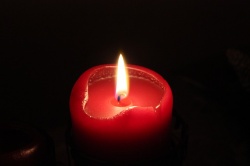
The Called To Be Holy Novena of Prayer is now permanently available as a resource on this website: just click on Novena Day by Day above. You will find information about the authors, and a 'short office' - a reading, psalm and collects - for each day.
So if you missed the Novena, or would like to pray it again, or want to return to something that touched your heart during the Novena days you can still pray with us.
26 May 2015
Thank You...
...for joining with us in the Novena of Prayer. May the Spirit of Truth continue to move the hearts of all who value our English spiritual heritage to work for the unity of Christ's Church. Ut unum sint!
Please tell us how you used the Novena in your group - click on Contact Us above.
Many of us will have sung this hymn - the 'Golden Sequence' - on Pentecost Sunday. It is a translation of Veni Sancte Spiritus, attributed to Cardinal Stephen Langton, Archbishop of Canterbury between 1207 and his death in 1228.
 Come, Thou holy Paraclete,
Come, Thou holy Paraclete,
And from Thy celestial seat
Send Thy light and brilliancy:
Father of the poor, draw near;
Giver of all gifts, be here;
Come, the soul’s true radiancy.
Come, of comforters the best,
Of the soul the sweetest guest,
Come in toil refreshingly:
Thou in labour rest most sweet,
Thou art shadow from the heat,
Comfort in adversity.
O Thou Light, most pure and blest,
Shine within the inmost breast
Of Thy faithful company.
Where Thou art not, man hath naught;
Every holy deed and thought
Comes from Thy divinity.
What is soilèd, make Thou pure;
What is wounded, work its cure;
What is parchèd, fructify;
What is rigid, gently bend;
What is frozen, warmly tend;
Strengthen what goes erringly.
Fill Thy faithful, who confide
In Thy power to guard and guide,
With Thy sevenfold mystery.
Here Thy grace and virtue send:
Grant salvation in the end,
And in Heav’n felicity.
Pentecost:
Cope by Sir John Ninian Comper (1864–1960)
© Victoria and Albert Museum, London
24 May 2015
A homily given by Cardinal Vincent Nichols on the Solemnity of the Ascension of the Lord, 17 May 2015, at the Church of Our Lady of the Assumption, Warwick Street.
Cardinal Nichols has been following our Novena of Prayer with us: here are his words...
 On this feast of the Ascension of the Lord, we take a further major step in our celebration of the Paschal Mystery, the exploration of our Easter faith.
On this feast of the Ascension of the Lord, we take a further major step in our celebration of the Paschal Mystery, the exploration of our Easter faith.
I am delighted to be celebrating this great Feast here in the Church of Our Lady of the Assumption Warwick Street in the community of the Personal Ordinariate of Our Lady of Walsingham. Thank you.
Today we take to heart again the real impact of the glorious resurrection of the Lord. You will recall those words:
'In ancient times, Christians all over the world began with a morning salutation to his neighbour 'Christ is Risen'; and his neighbour answered him, 'Christ is risen indeed and hath appeared unto Simon'.
These words, of course, come from the Blessed John Henry Newman, from his Parochial and Plain Sermons. I have borrowed them from the booklet that has so carefully been prepared, in the Ordinariate, for the Novena of Prayer Called to be Holy which is now in its third day. Thank you for that initiative.
Newman's first experience of Catholic liturgy and prayer occurred of course here in this church. It flowered slowly in his life yet the essence of the fullness of that Catholic faith can be recognised in this passage. In these reflections on the centrality of the resurrection, he develops that sense in two ways. Firstly he recognises the appearances of the risen Lord as a great act of God's mercy, for he continues: 'Even to Simon, the coward disciple who denied him thrice, Christ is risen; even to us who long ago vowed to obey him and yet so often denied him before men, so often taken part with sin and followed the world when Christ called us another way.' Today we renew in our hearts our loving gratitude to a Lord who looks so kindly and mercifully upon us.
Then, secondly, Blessed John Henry points to a further meaning of the appearances of the Lord to Simon Peter. He writes: 'To Simon Peter the favoured Apostle, on whom the Church is built, Christ appeared. He has appeared to his Holy Church first of all, and in the Church he dispenses blessings, such as the world knows not of.' Today we rejoice in our full and visible communion with Peter, with his successor, Pope Francis, for it is within this communion that the words of Newman find their fullest expression: 'Blessed are they in that they knew their blessedness, who are allowed as we are, week after week, and Festival after Festival, to seek and find in that Holy Church the Saviour of their souls!' Today we pray for the visible unity of the Church, despite our many divisions and scattered gifts, so that a more powerful witness to the full richness of all God's tokens of love may be offered to our world. May our faith in the risen Lord strengthen this resolve within us.
Today we particularly reach out to embrace the wonder of the Ascension of our Blessed Lord into heaven. This is surely the Festival of the unfolding of our destiny. We pray that where He the Head has gone may we his Body most certainly follow.
Our faith, and the witness we wish to give, is centred round this promise. Our destiny is, quite simply, the fulfilling in each of us of the Paschal Mystery we are celebrating. From the moment of our first existence, this has been the Father's loving purpose in creating us: that we will come to share in the eternal life of heaven, in the inexpressible joy of His presence. We too are to ascend into heaven and share in that eternal glory. This is what makes sense of all we try to do each day. And when that destiny, that true purpose or finality of life, disappears from human sight and striving, then faith is flattened and sooner or later loses its true depth and attractiveness.
Here too we learn about the Father's mercy. The first act of God's mercy towards each of us is the gift of life and of a life that is not without purpose, not ultimately futile just as many fear. Rather it is endowed with the most wonderful of promises. The mercy of God, on which we are invited to ponder continually, is nothing other than the restless love of the Father longing for us to receive and embrace our true destiny. His merciful love is never exhausted, but flows to us time and again that we may start out afresh after every failure and disappointment.
Those who counterpose the mercy of God with the commandments of God misunderstand both mercy and commandment. The commandments of God are given to us as a mercy, to help us how to live on the pathway of our true dignity and highest calling. They are not restrictions on our legitimate freedoms. They are not rules that above all else we have to obey. Rather they are the unfolding into practical living of our deepest nature and destiny. God's mercy then is not something which enables us to overlook those commandments or somehow imagine that we are excused their calling. Rather it is the eternal restlessness of God's love calling us again and again to raise our eyes beyond the horizons we have set for ourselves, the limits of what we believe we can manage, the limits of what we think can reasonably be asked of us. He calls us to reach out again for the fullness of his love, opening our hearts again to its light and joy. Mercy enables us to start out again, not stop where we are comfortable, not satisfied in just being accepted as we are.
At the heart of our spiritual lives, then, lies this deep desire: that all we do may be in accordance with this overwhelming will of God for our salvation, for our fulfilment. Our salvation is secured. This we know. My work is not to earn or effect that salvation, but to walk in its path, to grasp the gift and rejoice in it.
The Called to be Holy Novena also brings us the teaching of Evelyn Underhill. She writes: 'What is asked of us is not necessarily a great deal of time devoted to what we regard as spiritual things, but the constant offering of our wills to God, so that the practical duties which fill most of our days can become part of His order and be given spiritual worth.' She continues, 'Among the things which we should regard as spiritual in this sense are our household or professional work, the social duties of our station, friendly visits, kind actions, and small courtesies, and also necessary recreation of body and of mind, so long as we link all these by intention with God.'
This, indeed, is our pathway to our ascension, for in union with Jesus all things can be turned to the service of the Father and brought, in His day, to be placed before his throne. No longer do our days lack a clear and definite sense of purpose!
At the Ascension, the Lord leaves behind his bodily presence among us so that he may be with us in new ways, not limited by time or place. Those new ways we celebrate most fully through the great Festival of Pentecost, with which the Paschal Mystery is completed. Though the great outpouring of the Holy Spirit the merciful presence of the risen Lord will abide with us always.
Lancelot Andrewes writes so beautifully of this 'in-dwelling':
Yet this new presence, by which he nurtures and strengthens us every day, retains a wonderful kind of physical presence, something that we can come to, locate, behold, touch, and receive.
Andrewes continues: 'You shall observe: there ever was and will be a near alliance between 'the gifts he sent' (the Holy Spirit) and the 'gifts he left us'. He left us the gifts of his body and blood. His body broken, and full of the characters of love all over. His blood shed, every drop whereof is a great drop of love. To those which were sent, these which were left, love, joy, peace, have a special connatural reference, to breed and to maintain each other. His Body the Spirit of strength, his Blood the Spirit of comfort; both the Spirit of love.'
Today we bring all our best gifts to this celebration of the risen and ascended Lord. In this Liturgy we are again taken up into the mystery we celebrate, it is our destiny and therefore our deepest joy. Here, again, we learn who we are: a people bound together in Christ and in the mystery of His visible Church. Here we learn again what we are to be: raised on high into the fullness of the light and joy of God, a wonderful and awesome prospect which we could never imagine or grasp of ourselves, yet given to us by the gracious and free gift of the Father. In his mercy, expressed so fully in the face of our Saviour, and made so powerfully effective in the outpourings of the Holy Spirit, may we journey towards his Kingdom, using all our wit and wisdom to make known this great mystery, for which our world so painfully longs. Amen.
With thanks to the Archdiocese of Westminster
23 May 2015
Day Nine of the Novena of Prayer
Click on 'Novena Day by Day' above to pray with us...
Today we pray with MICHAEL RAMSEY (1904-1988)
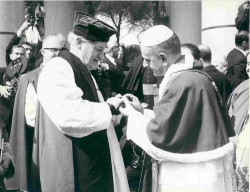 Arthur Michael Ramsey was born in 1904, and became 100th Archbishop of Canterbury in 1961. He longed for the unity of the Church: he did much to build relationships between the Church of England and the Eastern Churches, and was disappointed when plans for union between Anglicans and Methodists failed. In 1966 he became the first Archbishop of Canterbury in modern times to make a formal visit to the Vatican. Pope Paul VI took off his own episcopal ring and gave it to Ramsey, who wore it until the day he died. The ring is now worn whenever Archbishops visit the Vatican. Shy and considered by some to be eccentric, Ramsey was a man of deep spirituality and highly regarded as a retreat conductor. He was unafraid in speaking out against the social injustices of his day. Some of his most moving and powerful words were given as ordination charges to the clergy of Durham (such as today's reading) when he was Bishop there from 1952 to 1956.
Arthur Michael Ramsey was born in 1904, and became 100th Archbishop of Canterbury in 1961. He longed for the unity of the Church: he did much to build relationships between the Church of England and the Eastern Churches, and was disappointed when plans for union between Anglicans and Methodists failed. In 1966 he became the first Archbishop of Canterbury in modern times to make a formal visit to the Vatican. Pope Paul VI took off his own episcopal ring and gave it to Ramsey, who wore it until the day he died. The ring is now worn whenever Archbishops visit the Vatican. Shy and considered by some to be eccentric, Ramsey was a man of deep spirituality and highly regarded as a retreat conductor. He was unafraid in speaking out against the social injustices of his day. Some of his most moving and powerful words were given as ordination charges to the clergy of Durham (such as today's reading) when he was Bishop there from 1952 to 1956.
He died in 1988; in his memorial address Owen Chadwick said: ‘He did not think that there was enough quiet in the world. To realise God you need silence.’
Please let us know how you are using the Novena - click on 'Contact Us' above
22 May 2015
Day Eight of the Novena of Prayer
Click on 'Novena Day by Day' above to pray with us...
 Today we pray with EVELYN UNDERHILL (1875-1941)
Today we pray with EVELYN UNDERHILL (1875-1941)
In the first half of the 20th century Evelyn Underhill was one of the most widely read writers on spirituality. She moved from an agnosticism to faith, but her husband Hubert Stuart Moore was opposed to her desire to become a Catholic. She found what she believed to be a staging post in Anglo-Catholicism, but remained there all her life. Her spiritual mentor from 1921 to 1924 was Baron Friedrich von Hugel who encouraged her to focus her mysticism in Christ. Both before and after the First World War there was great fascination with philosophy, spirituality and mysticism among British people. Evelyn Underhill was concerned that ‘state religion’ was out of touch with this deep longing and in her writings sought to popularise an orthodox Christian approach to the spiritual world. She was not without her critics for her attempts to make the mystical life open to ordinary people. Mysticism (1911) and Worship (1936) were among her most influential books.
Please let us know how you are using the Novena - click on 'Contact Us' above
21 May 2015
Day Seven of the Novena of Prayer
Click on 'Novena Day by Day' above to pray with us...
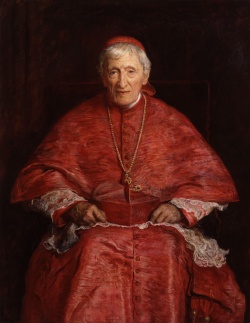 Today we pray with BLESSED JOHN HENRY NEWMAN (1801- 1890)
Today we pray with BLESSED JOHN HENRY NEWMAN (1801- 1890)
Newman was born in 1801, grew up in London where his father was a banker, and came under the influence of the Evangelical revival in his teenage years. In later years he always looked back at this as the saving of his soul, yet came to believe that Evangelicalism, in rejecting the Church, opened the door to liberal interpretations of the Christian faith. In 1821 he graduated from Trinity College, Oxford, and the following year was elected to a Fellowship at Oriel. In 1825 he was ordained a priest of the Church of England, and in 1828 became vicar of the University Church of St Mary the Virgin. Various influences (reading the early Church Fathers, for example) played on Newman as he began to move away from the Low Church party of the C of E. On 14 July 1833 John Keble preached his famous sermon, ‘National Apostasy’, which Newman later judged to be the start of the Oxford Movement, which set about restoring to the C of E discipline and doctrine in accordance with the Book of Common Prayer. The publication of the Tracts for the Times caused a furore across the country, but in time Newman came to doubt whether the middle way of the C of E (between Roman Catholicism and Protestantism) could be upheld. In 1845 he was received into the Catholic Church and ordained priest the following year in Rome. He returned to England as an Oratorian, finally settling in Birmingham. His scholarship, from both his Anglican and Catholic days, has been widely revered, as has his mastery of the English language. It has been asserted that Newman’s theological thinking, not always appreciated in his lifetime, found its expression in the renewal of Catholic life with the Second Vatican Council.
Please let us know how you are using the Novena - click on 'Contact Us' above
20 May 2015
Day Six of the Novena of Prayer
Click on 'Novena Day by Day' above to pray with us...
Today we pray with THOMAS KEN (1637-1711)
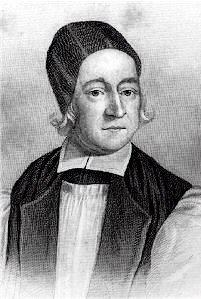 Born at Little Berkhamstead in Hertfordshire, Thomas Ken was for a time tutor at Oxford, before his ordination in the Church of England in 1662. After serving in a number of parishes, he became Prebendary of Winchester, and chaplain to the Bishop. During this time he began to write the hymns for which he is best remembered, including ‘Awake my soul and with the sun’, for using in the morning, and ‘Glory to thee, my God, this night’ for the evening. In 1680 King Charles II appointed Ken one of his chaplains. Although popular with the King, Ken refused to provide accommodation for Nell Gwynne, the King’s mistress, in his house in Winchester. In spite of (or maybe because of) Ken’s conscientiousness, Charles appointed him Bishop of Bath and Wells. Among his first duties as a Bishop in 1685 was to minister to the King on his death-bed. In 1688 Ken was among the group of Bishops imprisoned by King James II for their refusal to read the Declaration of Indulgence which he regarded as compromising the position of the Church of England. He and his fellow Bishops were acquitted, but when Parliament replaced James with William of Orange and Mary, his wife, Ken refused to take a fresh oath to the new King and Queen. So he was deprived of his see, thus joining the ranks of the Non-Jurors. He retired to Longleat House in Somerset, and died in 1711.
Born at Little Berkhamstead in Hertfordshire, Thomas Ken was for a time tutor at Oxford, before his ordination in the Church of England in 1662. After serving in a number of parishes, he became Prebendary of Winchester, and chaplain to the Bishop. During this time he began to write the hymns for which he is best remembered, including ‘Awake my soul and with the sun’, for using in the morning, and ‘Glory to thee, my God, this night’ for the evening. In 1680 King Charles II appointed Ken one of his chaplains. Although popular with the King, Ken refused to provide accommodation for Nell Gwynne, the King’s mistress, in his house in Winchester. In spite of (or maybe because of) Ken’s conscientiousness, Charles appointed him Bishop of Bath and Wells. Among his first duties as a Bishop in 1685 was to minister to the King on his death-bed. In 1688 Ken was among the group of Bishops imprisoned by King James II for their refusal to read the Declaration of Indulgence which he regarded as compromising the position of the Church of England. He and his fellow Bishops were acquitted, but when Parliament replaced James with William of Orange and Mary, his wife, Ken refused to take a fresh oath to the new King and Queen. So he was deprived of his see, thus joining the ranks of the Non-Jurors. He retired to Longleat House in Somerset, and died in 1711.
Please let us know how you are using the Novena - click on 'Contact Us' above
19 May 2015
Day Five of the Novena of Prayer
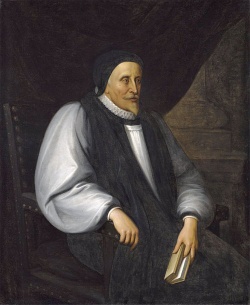 Click on 'Novena Day by Day' above to pray with us...
Click on 'Novena Day by Day' above to pray with us...
Today we pray with LANCELOT ANDREWES (1555-1626)
Born soon after the break with Rome, Lancelot Andrewes was ordained to the ministry of the Church of England in 1580. A noted linguist and preacher he was by 1601 Dean of Westminster. During the reign of King James I he was successively Bishop of Chichester, Ely and Winchester, and oversaw the compiling of the Authorised Version of the Bible.
Please let us know how you are using the Novena - click on 'Contact Us' above
18 May 2015
Day Four of the Novena of Prayer
Click on 'Novena Day by Day' above to pray with us...
 Today we pray with JULIAN OF NORWICH
Today we pray with JULIAN OF NORWICH
She was born around the year 1342 but little is known of the life of Julian – even her name is taken from the church to which her anchorite cell was attached. She appears to have come from a comfortably-off family at a time when Norwich was the second largest city in England. At the age of 30, while still at home, Julian suffered a severe illness from which she was expected to die. During her illness she experienced mystical visions of Jesus Christ, and on her recovery on 13 May 1373 she immediately set down the content of these visions in the Revelations of Divine Love. Some twenty to thirty years later she wrote a longer treatise, explaining the theology behind the visions. Her writings were not widely known in mediaeval England, and indeed it was not until the second half of the 20th century that she became popular. Some of this popularity may be ascribed simply to the fact that she was a woman, and her writings are the earliest by a woman known in English literature. Rather more important for us is her essential optimism about God and humanity, sin and forgiveness, in an age of terrible suffering, when sickness was widely regarded as divine punishment. She is not a ‘universalist’ in the modern sense of that word but poses the question made famous in the 20th century by Hans Urs von Balthasar, ‘Dare we hope that all men will be saved?’
Please let us know how you are using the Novena - click on 'Contact Us' above
17 May 2015
Day Three of the Novena of Prayer
Click on 'Novena Day by Day' above to pray with us...
Today we pray with THE CLOUD OF UNKNOWING
 The Cloude of Unknowyng was written in Middle English in the second half of the 14th century by an anonymous author, sometimes thought to be a Carthusian (Michael Ramsey, whom we shall meet later in these pages, believed the author to be a woman). It is a guide for a young person who desires to grow in the contemplative life. The work draws on the ancient mystical tradition of the via negativa, saying of God that ‘by love he may be caught and held, but by thinking never’. The seeker is advised that God’s grace is always utterly undeserved: we must strip away all intellectual desire for knowledge and control and be content to wait meekly in unknowing for the gift of contemplative prayer, which is described as God’s ‘work’ in us. It is to be truly ‘oned’ with God.
The Cloude of Unknowyng was written in Middle English in the second half of the 14th century by an anonymous author, sometimes thought to be a Carthusian (Michael Ramsey, whom we shall meet later in these pages, believed the author to be a woman). It is a guide for a young person who desires to grow in the contemplative life. The work draws on the ancient mystical tradition of the via negativa, saying of God that ‘by love he may be caught and held, but by thinking never’. The seeker is advised that God’s grace is always utterly undeserved: we must strip away all intellectual desire for knowledge and control and be content to wait meekly in unknowing for the gift of contemplative prayer, which is described as God’s ‘work’ in us. It is to be truly ‘oned’ with God.
In the words of Chapter 32: ‘And this meekness obtaineth to have God himself mightily descending, to venge thee of thine enemies, for to take thee up, and cherishingly dry thine ghostly eyen; as the father doth the child that is in point to perish under the mouths of wild swine or wode [furious] biting bears.’
Evelyn Underhill wrote: ‘for the author of the Cloud all human virtue is comprised in the twin qualities of Humility and Charity. He who has these, has all.'
Please let us know how you are using the Novena - click on 'Contact Us' above
16 May 2015
Day Two of the Novena of Prayer
Click on 'Novena Day by Day' above to pray with us...
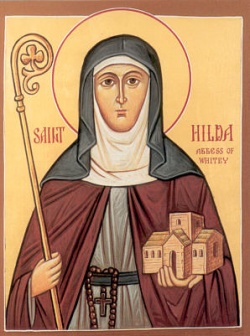 Today we pray with HILDA AND CÆDMON OF WHITBY
Today we pray with HILDA AND CÆDMON OF WHITBY
Hilda grew up at the court of her uncle, King Edwin, and was baptised and educated by St Paulinus. She entered religious life at the age of thirty-three, and in 657 she founded a double monastery of monks and nuns at Whitby, which soon became a famed centre of learning. Bede tells us that she ‘began immediately to order it in all things under a rule of life, according as she had been instructed by learned men; for Bishop Aidan [of Lindisfarne], and others of the religious that knew her, frequently visited her and loved her heartily, and diligently instructed her, because of her innate wisdom and love of the service of God.’ Hilda’s connection with St Aidan strengthened her great love of the Irish Christian tradition, but she was also passionate about the unity of the Church. In 664 she hosted the Synod of Whitby where her guidance helped ensure that the Northumbrian Church came to follow the authority of Rome in such matters as the dating of Easter. She was known by all as ‘Mother’: among those she encouraged was the illiterate shepherd (or cow-herd) Cædmon, ‘joyfully recognising the grace of God in the man’, as Bede says. Cædmon’s divinely inspired song of praise for the Creator (today's reading) is the gift of them both to the Church.
Please let us know how you are using the Novena - click on 'Contact Us' above
15 May 2015
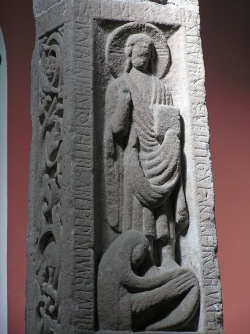 Day One of the Novena of Prayer
Day One of the Novena of Prayer
Click on 'Novena Day by Day' above to pray with us...
Today we pray with THE DREAM OF THE ROOD
The Dream of the Rood is perhaps one of the earliest works of Old English literature, possibly written in the eighth century by an unknown poet. It recounts a dream in which the narrator sees a tree - the Cross - resplendent with jewels, but also stained with blood, that stands at the centre of the earth. The Cross tells the dreamer its story: wounded like its Lord by the cruel nails and enduring the mocking with him, it stands firm as the throne of the hero-king, the incarnate God, who willingly embraces suffering and triumphs over it to redeem the whole world.
Passages from the poem were carved on the Ruthwell Cross in the ninth century.
Please let us know how you are using the Novena - click on 'Contact Us' above
13 May 2015
 'How little people know who think that holiness is dull. When one meets the real thing, it is irresistible.'
'How little people know who think that holiness is dull. When one meets the real thing, it is irresistible.'
(C S Lewis, Letters To An American Lady)
Remember the Called To Be Holy Novena begins this Friday. Simply click on Novena Day by Day above for the reading, psalm and collect for each day. Please pray with us!
If you would like a paper copy for yourself or as a gift for a friend, click on Novena Booklet.
And don't forget the Children's Novena!
image from pixabay.com
9 May 2015
The Called To Be Holy prayer cards
We have been asked about the pictures we chose for our prayer cards, and as there was not enough room on the cards themselves to include a description, we thought we would tell you a little about them here. They were all chosen as examples of English spiritual art (a reminder that the 'riches of English spirituality' on which we have drawn for Called To Be Holy are not confined to the written word). All of these images have been used to enhance the worship of God through the ages.
Lent - St Michael and the dragon
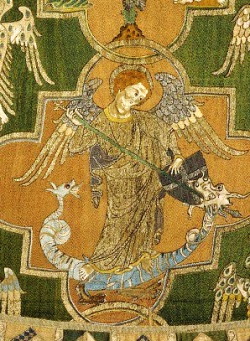 This is a detail from the Syon Cope, now in the Victoria & Albert Museum in London. It was made between about 1300 and 1320 and is an example of Opus Anglicanum, the elaborate embroidery for which the English were particularly famous. The image refers to Revelation 12:7-8, 'And war broke out in heaven; Michael and his angels fought against the dragon. The dragon and his angels fought back, 8 but they were defeated, and there was no longer any place for them in heaven.' This seemed a good image to contemplate during Lent.
This is a detail from the Syon Cope, now in the Victoria & Albert Museum in London. It was made between about 1300 and 1320 and is an example of Opus Anglicanum, the elaborate embroidery for which the English were particularly famous. The image refers to Revelation 12:7-8, 'And war broke out in heaven; Michael and his angels fought against the dragon. The dragon and his angels fought back, 8 but they were defeated, and there was no longer any place for them in heaven.' This seemed a good image to contemplate during Lent.
image © Victoria & Albert Museum
Passiontide - the Crucifixion
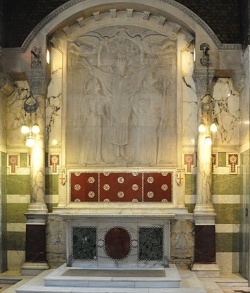
Above the altar of the Chapel of St George and the English Martyrs in Westminster Cathedral is the last carving made by the sculptor and typeface designer Eric Gill, who died in 1940. It shows Christ the Universal King reigning triumphant from the Cross; to his left stands St Thomas More, Lord Chancellor of England, and to his right St John Fisher, Bishop of Rochester. Both men were executed in 1535 for their refusal to deny the Supremacy of the Pope under King Henry VIII. Visitors are invited to pray here for the unity of the Church, the wounded Body of Christ:
'Lord, we pray for all those who
witness to the Gospel in this land.
May all Christians work to heal
divisions within the Church,
So that together we may bear witness to Jesus Christ.'
(Read more here)
Easter - the Risen Christ with his wounds
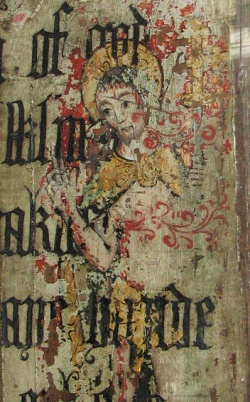
Devotion to the five wounds of Christ was an important spiritual practice throughout Europe in the Middle Ages. This is a painting from the mediaeval Rood Screen in Binham Priory, Norfolk.
During the Protestant iconoclasm of the sixteenth century the image was painted over with whitewash and words in Black Letter script from Cranmer's Bible of 1539: For coueteousnes of money is the roote of all euyll...(1 Timothy 6:10-12).
We can now see the restored image and look again, as Christians before us did, on the face of the risen Lord.
image © Evelyn Simak
Pentecost - The Tree of Life
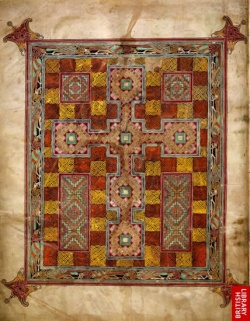
Many people will recognise this as an illustration from the Lindisfarne Gospels: an illuminated manuscript gospel book produced around the year 700 in a monastery on Lindisfarne (or Holy island) off the coast of Northumberland. It can now be seen in the British Library in London. The manuscript is one of the finest examples of 'Insular' art which combines Mediterranean, Anglo-Saxon and Celtic elements.
This is what is sometimes called a 'carpet page': the geometric design with a repeated pattern squares represents the Gospel being taken to the four corners of the world. The Cross is empty - Christ is risen - but the whole page teems with symbols of new life in the Spirit. Among the rich colours, red represents life-blood and love, while gold stands for the radiance of heaven. The knot work, with spiral patterns going into the centre and back again, tells us about the journey into God of the Christian life; the intertwined animals and birds framing the Cross represent creation in all its vitality.
4 May 2015
Mary's Month
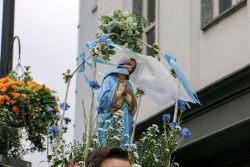 May is Mary’s month, and I
May is Mary’s month, and I
Muse at that and wonder why...
wrote Gerard Manley Hopkins, and he continued:
Ask of her, the mighty mother:
Her reply puts this other
Question: What is Spring? -
Growth in every thing...
All things rising, all things sizing
Mary sees, sympathising
With that world of good,
Nature’s motherhood.
Their magnifying of each its kind
With delight calls to mind
How she did in her stored
Magnify the Lord.
The holy time of expectant prayer between Ascension and Pentecost always falls at least partly in May, and this year we will be praying our Called To Be Holy Novena during Mary's month. In another poem, The Virgin Mary Compared To The Air We Breathe, Hopkins tells us that Mary
this one work has to do -
Let all God’s glory through
This is Mary's Call To Be Holy - and ours. May Our Lady pray for us her Son's prayer, ut unum sint, and may we pray it with her this May, to the greater glory of God.
The image above is from the May Procession of Our Lady at Most Precious Blood, The Borough - home of the London (South) Ordinariate Group.
30 April 2015
What God wants most of all...
So what does Called To Be Holy mean? Pope Benedict gave an answer in his address to Catholic schoolchildren in the UK during his visit in 2010:
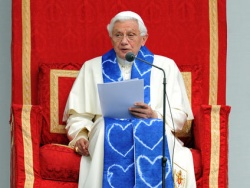
Dear young friends…
There is something I very much want to say to you. I hope that among those of you listening to me today there are some of the future saints of the twenty-first century. What God wants most of all for each one of you is that you should become holy. He loves you much more than you could ever begin to imagine, and he wants the very best for you. And by far the best thing for you is to grow in holiness.
Perhaps some of you have never thought about this before. Perhaps some of you think being a saint is not for you. Let me explain what I mean. When we are young, we can usually think of people that we look up to, people we admire, people we want to be like. It could be someone we meet in our daily lives that we hold in great esteem. Or it could be someone famous. We live in a celebrity culture, and young people are often encouraged to model themselves on figures from the world of sport or entertainment. My question for you is this: what are the qualities you see in others that you would most like to have yourselves? What kind of person would you really like to be?
When I invite you to become saints, I am asking you not to be content with second best. I am asking you not to pursue one limited goal and ignore all the others. Having money makes it possible to be generous and to do good in the world, but on its own, it is not enough to make us happy. Being highly skilled in some activity or profession is good, but it will not satisfy us unless we aim for something greater still. It might make us famous, but it will not make us happy. Happiness is something we all want, but one of the great tragedies in this world is that so many people never find it, because they look for it in the wrong places. The key to it is very simple – true happiness is to be found in God. We need to have the courage to place our deepest hopes in God alone, not in money, in a career, in worldly success, or in our relationships with others, but in God. Only he can satisfy the deepest needs of our hearts.
Not only does God love us with a depth and an intensity that we can scarcely begin to comprehend, but he invites us to respond to that love. You all know what it is like when you meet someone interesting and attractive, and you want to be that person’s friend. You always hope they will find you interesting and attractive, and want to be your friend. God wants your friendship. And once you enter into friendship with God, everything in your life begins to change. As you come to know him better, you find you want to reflect something of his infinite goodness in your own life. You are attracted to the practice of virtue. You begin to see greed and selfishness and all the other sins for what they really are, destructive and dangerous tendencies that cause deep suffering and do great damage, and you want to avoid falling into that trap yourselves. You begin to feel compassion for people in difficulties and you are eager to do something to help them. You want to come to the aid of the poor and the hungry, you want to comfort the sorrowful, you want to be kind and generous. And once these things begin to matter to you, you are well on the way to becoming saints.
Read the full text of his address here
There will be resources for children's activities available very soon, so that they too can share in our Called To Be Holy celebrations - watch this space!
18th April 2015
The follow-up to last year’s celebrations of Called To Be One: Called To Be Holy is a direct response to the question posed by Cardinal Nichols in his address at the Festival in September: ‘Does what you do, in pursuit of a proper distinctiveness, clearly lead to holiness? Is it in the service of sanctification? This is what counts.’
Once again, Ordinariate groups will be hosting events in their own areas. The heart of the celebration will be a Novena from May 15 to 23 (Ascension to Pentecost); all Ordinariate members are encouraged to join in - and to invite family and friends to pray with them. Groups will soon be receiving copies of a booklet containing material for prayer and reflection drawn from writers in the English spiritual tradition, from the eighth century Dream Of The Rood to Michael Ramsey, 100th Archbishop of Canterbury. By now, we should all have seen the accompanying prayer cards, illustrated with examples of Christian spiritual art through the ages.
Each group is asked to host a Day of Recollection, either during the week of the Novena or later in the year. We are asked to offer an invitation to other Christians to spend the day with us: our English spiritual heritage is one we can all share, in a powerful experience of praying together. Plenty of resources are available: a new DVD with a message from the Ordinary, a poster which can be personalised with details of local events, and materials for children’s activities.
If you have not already done so, please download the poster here.
27th February 2015
The poster for the Called to be Holy Novena is now available for download. The Novena will run from Friday 15th May to Saturday 23rd May, from the Ascension to Pentecost. Ordinariate Groups across the country will be hosting a day of recollection, during the Novena. Details of local events in May will be posted on this website as soon as they are available.
It will also be possible to join in a 'virtual' Novena by following the spiritual writings, prayers and reflections published on this website.
Click here to download the poster.
